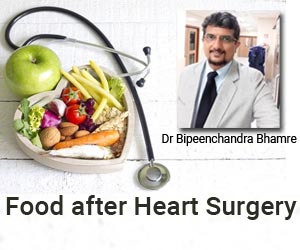- Home
- Editorial
- News
- Practice Guidelines
- Anesthesiology Guidelines
- Cancer Guidelines
- Cardiac Sciences Guidelines
- Critical Care Guidelines
- Dentistry Guidelines
- Dermatology Guidelines
- Diabetes and Endo Guidelines
- Diagnostics Guidelines
- ENT Guidelines
- Featured Practice Guidelines
- Gastroenterology Guidelines
- Geriatrics Guidelines
- Medicine Guidelines
- Nephrology Guidelines
- Neurosciences Guidelines
- Obs and Gynae Guidelines
- Ophthalmology Guidelines
- Orthopaedics Guidelines
- Paediatrics Guidelines
- Psychiatry Guidelines
- Pulmonology Guidelines
- Radiology Guidelines
- Surgery Guidelines
- Urology Guidelines
Food after Heart Surgery: Breaking down common myths- Dr Bipeenchandra Bhamre

Heart problems are on a rise, due to the risk factors like high blood pressure, diabetes mellitus, high cholesterol, stress, faulty eating habits, and following a sedentary lifestyle, lack of exercise. Thus, after suffering from heart problems and undergoing surgery, people are often confused about what they should eat and delete. Here, we help you dispell the most common myths related to food after heart surgery.
As doctors, we advise our patients to opt for a healthy, and a well-balanced diet. This is so because adhering to healthy eating habits is crucial for quick recovery, and to help the patient protect his/her heart against further problems. After heart surgery, the patient needs to eat well so that the incisions heal well. The patient should eat homemade food to avoid infections in the first few months after surgery.
Most of the people should understand that our Indian homemade food habits are good enough except a few things that we must avoid. I do not advise our patient’s drastic changes in their food habits after surgery as then they don’t eat because they don’t like the food as it becomes tasteless. They require eating certain portions of food to recover from surgery to heal the incisions. Some food must be totally avoided but there are certain myths which can be bothersome. Here, we help you clear some common misconceptions regarding the diet after surgery.
Myth: Eating certain ‘superfoods’ will help keep heart diseases at bay
Fact: there is no superfood. Yes, you have heard it right! Though, foods like blueberries, pomegranates, walnuts, and fish are good for your ticker. But, they will not prevent you from developing heart disease. Furthermore, certain diets can, however, help you do so. According to tons of studies, the Mediterranean diet, which consists of whole grains, legumes, vegetables, fruit, and monounsaturated fats like olive oil, once in a week fish and or Poultry chicken, has shown to reduce the risk of heart disease. In our own Indian food culture, we eat mostly vegetarian food all week and once in week non-vegetarian which consist of fish or chicken, red meat which should be avoided as it contains loads of cholesterol.
Myth: Fats are not good
Fact: Our body requires cholesterol in a certain amount daily as most of our hormones are made up of cholesterol. Our brain and some muscles require cholesterol as fuel. So we need cholesterol or fat but the quality and quantity are important. Qualitatively, fast foods, artificially made fats, some of the baked food, processed food must be avoided. Not only these, even high sugar foods like soft drinks, etc. have also shown to be bad for our heart. Saturated fats, which are derived from animal products like red meat and butter, also tend to raise one’s LDL levels. Whereas, monounsaturated fats and polyunsaturated fats may lower your LDL levels when used in place of saturated fats. This simply implies that eating more unprocessed food or natural food will keep our cholesterol level in check. Our daily need for fats should be kept 10% of our energy need which roughly comes about 30-35gms per day.
Myth: Salt is not as dangerous as it is a natural product
Fact: excess salt is more dangerous than fats and sugar. It not only raises our blood pressure but also puts lots of load on our kidneys. Salt is naturally found in most of the food items which we opt for. Therefore, we should not add salt. But, when speaking about processed foods, the amount of salt is often above naturally occurring levels. Eating too much salt can raise our blood pressure due to the extra water stored in the body. High blood pressure can put a strain on our heart, arteries, kidneys, and brain. Moreover, it can also increase the risk of heart attacks, strokes, and kidney disease. Thus, It important to monitor our salt consumption, and eat foods which contain less amount of salt. Also, doctors are advised to guide their patients on the amount of salt they should consume per day as going overboard is a strict no-no.
Take-away message: Eating well, sleeping well and regular exercise after open-heart surgery is a must. After open-heart surgery, oily fried junk foods must be avoided. Quantity of food should be controlled. The quantity of food is as important as the quality of food. Our Indian eating habits are reasonably satisfactory. Eating homemade food all the time while recovering from surgery is highly recommended. Saturated fat and salt intake should be restricted. Also, smoking cessation and cutting down alcohol consumption is highly recommended.
Dr Bipeenchandra Bhamre is a Cardio-Thoracic Surgeon at Sir H N Reliance Foundation Hospital and Research Centre, Mumbai,

Disclaimer: This site is primarily intended for healthcare professionals. Any content/information on this website does not replace the advice of medical and/or health professionals and should not be construed as medical/diagnostic advice/endorsement or prescription. Use of this site is subject to our terms of use, privacy policy, advertisement policy. © 2020 Minerva Medical Treatment Pvt Ltd